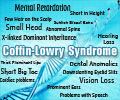According to a new study, it is only after children turn three years old that common inherited forms of intellectual disability is diagnosed in them, despite efforts to create awareness of the condition.
The researchers said that even with increased patient advocacy and professional recommendations regarding genetic testing, no significant changes in the age of diagnosis have occurred in the past seven years.Fragile X is not obvious at birth, and must be discovered as intellectual delays become evident.
Parents in the study said that they were frustrated with the length of time needed for diagnosis because it delays access to services, and often leads to the birth of a second child with fragile X.
"Awareness of fragile X syndrome has grown as a result of research, statements by professional organizations and advocacy," said Dr. Don Bailey, Distinguished Fellow at RTI International and the study's lead author.
"However, changing the age of diagnosis will be difficult without broader and more systemic changes in pediatric practice," Bailey added.
In the study involving 200 families of children with fragile X syndrome, the researchers found that average age of diagnosis of boys and girls remained relatively stable across the seven-year period, at approximately 35 to 37 months for boys and more than 41 months for girls.
Advertisement
"Routine genetic screening for fragile X syndrome, which would significantly benefit children and their families, would be accelerated by the development of a cheap and accurate screening test," said Bailey.
Advertisement
Source-ANI
TAN












